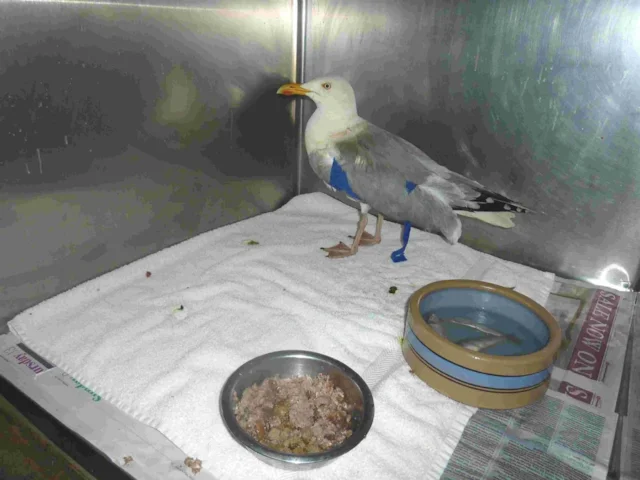RSPCA asks for gull amnesty
b897ee6f-6afc-427c-99c5-0ea9479231b3

The RSPCA is urging greater tolerance of gulls by the public this summer, as many are being admitted for care into its wildlife centres across the country.
Every year the charity receives calls about gulls which have been persecuted and the victim of cruel and abusive attacks. Many have stones thrown at them, others have their nests destroyed and large numbers are victims of people using them for pot shots with airguns, such as one poor bird brought to the Stapeley Grange centre in Nantwich, Cheshire.
Lee Stewart, manager of RSPCA Stapeley Grange wildlife centre, said: “Sadly this kind of incident is not as unusual as you would hope, and every year we deal with many cases of such callous attacks on these birds. Also it is at this time of year when gull chicks are young that their parents can ‘swoop’ on anyone who they see as a threat, which leads to much misunderstanding.”
Gulls and their nests are protected under the Wildlife and Countryside Act 1981 and it is illegal to intentionally kill, take or injure them – action can only be taken against them under licence. Herring Gulls in particular are a species of conservation concern in Britain and research has shown that overall gull populations are actually in decline.
Lee Stewart added: “All it takes is a little care and understanding to minimise any inconvenience caused by gulls – they are normally just behaving in a natural way. For instance, you can’t blame them for not knowing the difference between scraps willingly offered and your own bag of chips. They are simply wild animals following their instincts to find food. They don’t necessarily know that their nest is blocking your gutter and like any protective parent, their swooping is often just a way of keeping their babies safe.
“Deterrents and non-lethal methods of control are far better at helping to reduce problems. Not feeding the gulls and disposing of rubbish properly are two things we can all do to prevent gulls from causing a nuisance. Blocking off areas where gulls normally nest outside of the breeding season will also help to reduce any problems.”
The RSPCA gives the following advice on living in harmony with gulls:
Every year the charity receives calls about gulls which have been persecuted and the victim of cruel and abusive attacks. Many have stones thrown at them, others have their nests destroyed and large numbers are victims of people using them for pot shots with airguns, such as one poor bird brought to the Stapeley Grange centre in Nantwich, Cheshire.
Lee Stewart, manager of RSPCA Stapeley Grange wildlife centre, said: “Sadly this kind of incident is not as unusual as you would hope, and every year we deal with many cases of such callous attacks on these birds. Also it is at this time of year when gull chicks are young that their parents can ‘swoop’ on anyone who they see as a threat, which leads to much misunderstanding.”
Gulls and their nests are protected under the Wildlife and Countryside Act 1981 and it is illegal to intentionally kill, take or injure them – action can only be taken against them under licence. Herring Gulls in particular are a species of conservation concern in Britain and research has shown that overall gull populations are actually in decline.
Lee Stewart added: “All it takes is a little care and understanding to minimise any inconvenience caused by gulls – they are normally just behaving in a natural way. For instance, you can’t blame them for not knowing the difference between scraps willingly offered and your own bag of chips. They are simply wild animals following their instincts to find food. They don’t necessarily know that their nest is blocking your gutter and like any protective parent, their swooping is often just a way of keeping their babies safe.
“Deterrents and non-lethal methods of control are far better at helping to reduce problems. Not feeding the gulls and disposing of rubbish properly are two things we can all do to prevent gulls from causing a nuisance. Blocking off areas where gulls normally nest outside of the breeding season will also help to reduce any problems.”
The RSPCA gives the following advice on living in harmony with gulls:
- Try to keep food to yourself – they often can’t tell the difference between scraps willingly offered and your bag of chips!
- Dispose of edible litter carefully by putting it into gull-proof rubbish bins. Plastic bags left in the street are an open invitation for gulls to investigate.
- Gulls that swoop suddenly on people or pets are usually trying to protect chicks that have got out of the nest.
- Gulls make most noise between May and July when they are breeding. If gulls on your roof disturb you, or you are worried they may block a gas flue, you can prevent them nesting there in the first place. Your local environmental health department or pest control company should be able to tell you about the devices available.
- If you see a gull chick – usually mottled brown and grey in colour – out of the nest, leave it alone unless it is obviously injured – its parents will usually know where it is and are better equipped to take care of it than members of the public.

